

Why dolphins are deep thinkers. At the Institute for Marine Mammal Studies in Mississippi, Kelly the dolphin has built up quite a reputation.
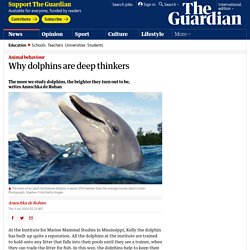
Unit 5 Office Hours Video - University of Minnesota. What makes an animal clever? Research shows intelligence is not just about using tools. Humans set themselves apart from other animals in a number of ways, including our ability to make tools.
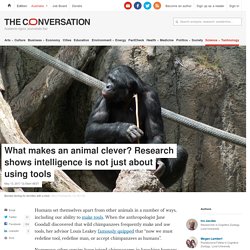
When the anthropologist Jane Goodall discovered that wild chimpanzees frequently make and use tools, her advisor Louis Leakey famously quipped that “now we must redefine tool, redefine man, or accept chimpanzees as humans”. Numerous other species have joined chimpanzees in knocking humans off their pedestal. Boxer crabs use stinging anemones as defensive weapons. American alligators place sticks on top of their snouts to catch egrets during their nesting season, when sticks become a valuable resource. Parrots frequently use a variety of objects to scratch themselves. The list goes on, and continues to grow with new research. Despite the large variation in which species use tools and how, this behaviour still has special significance.
Termites build extraordinary structures that perfectly fit their needs. Intelligent birds: what do we make of the evidence that they can ‘read’ minds, and are we just anthropomorphising? – the neurosphere. * Scientific study references are indicated in ().
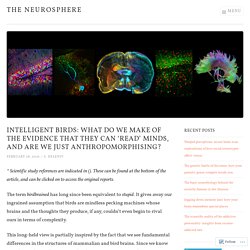
These can be found at the bottom of the article, and can be clicked on to access the original reports. Crows safeguard sticks to speed future food-finding forays. New Caledonian crows are protective of their tools.
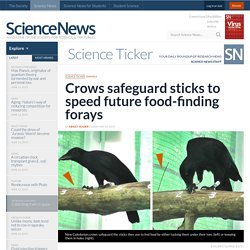
The birds safeguard the sticks they use to find food and become even more careful with the tools as the cost of losing them goes up. Researchers videotaped captive and wild Corvus moneduloides crows and tracked what the birds did with their sticks. In between eating, the birds tucked the tools under their toes or left them in the holes they were probing. When higher up in the trees, the birds dropped the tools less often and were more likely to leave them in the holes they were probing than when they were on the ground. The finding, published May 20 in the Proceedings of the Royal Society B, shows how tool-protection tactics can prevent costly losses that could keep the crows from chowing down. Earth - Cuddly sifakas fight off huge marauding snake. 9 questions about penguins you were too embarrassed to ask. Today is Penguin Awareness Day.

Dolphins Use Sponges To Access Novel Food Sources. Indo-Pacific bottlenose dolphins around Shark Bay, Australia, perform a unique behavior called “sponging”, which is where certain animals place sponges over their snouts during foraging activities.

Not all of the dolphins in this area display the behavior, and it was discovered that sponging was in fact culturally transmitted. Although it seemed plausible that sponging could be classified as tool use, it remained a mystery what the precise purpose of this behavior was; scientists postulated that it could serve to protect their beaks against abrasion from sharp objects whilst foraging for food. A new study aimed to shed light on why these animals might be using these sponges; in particular, whether sponging allowed the animals to access certain novel resources that non-spongers could not. They found evidence that the animals used sponges as tools to access food, meaning that they could exploit an otherwise unused niche. Methods Made Manifest - Episode 2. Methods Made Manifest - Episode 1. Speeding Towards Birds In A Car… For Science!
In the winter of 2006, Pierre Legagneux started measuring when birds would fly away from him, as he sped towards them in his white Peugeot.

This wasn’t an official part of his research; he was just bored. After a recent move, his mornings of cycling past bucolic villages and forests had been replaced by long, tedious drives. “I found it very boring so I found something to do while driving,“ he says. “I started recording birds flying away in front of my car.” Legagneux drove down roads with speed limits of 20, 50, 90 or 110 kilometres per hour, and either stuck exactly to those speeds or deliberately drove under or over them.
One year and 134 measurements later, Legagneux clearly showed that birds flee from incoming traffic at greater distances on roads with higher speed limits. Cunnilingus increases duration of sex in megabat species. The males of a species of megabat have been observed giving oral sex to females in a move that appears to prolong the duration of copulation, a study has shown.
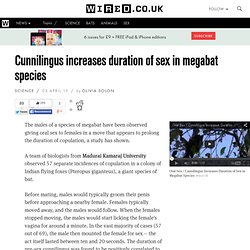
A team of biologists from Madurai Kamaraj University observed 57 separate incidences of copulation in a colony of Indian flying foxes (Pteropus giganteus), a giant species of bat. Before mating, males would typically groom their penis before approaching a nearby female. Females typically moved away, and the males would follow. When the females stopped moving, the males would start licking the female's vagina for around a minute. In the vast majority of cases (57 out of 69), the male then mounted the female for sex -- the act itself lasted between ten and 20 seconds. Chimps' Answer to Einstein. Natasha, a chimp at the Ngamba Island Chimpanzee Sanctuary in Uganda, has always seemed different from her peers.
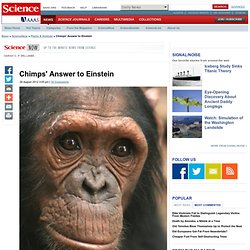
She's learned to escape from her enclosure, teases human caretakers, and scores above other chimps in communication tests. How do elephants trumpet? At last, scientists figure it out. Elephants' deepest calls can thunder up to 6 miles (10 kilometers) away.
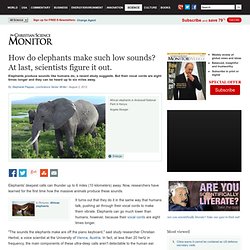
Now, researchers have learned for the first time how the massive animals produce these sounds. Skip to next paragraph Subscribe Today to the Monitor Click Here for your FREE 30 DAYS ofThe Christian Science MonitorWeekly Digital Edition It turns out that they do it in the same way that humans talk, pushing air through their vocal cords to make them vibrate. Until now, researchers weren't sure how elephants produced such low sounds. There are two ways to produce sound by vibrating the vocal cords (or vocal folds, as scientists call them). Gorilla Youngsters Seen Dismantling Poachers' Traps—A First.
"This is absolutely the first time that we've seen juveniles doing that ... I don't know of any other reports in the world of juveniles destroying snares," said Veronica Vecellio , gorilla program coordinator at the Dian Fossey Gorilla Fund 's Karisoke Research Center , located in the reserve where the event took place. BBC Nature - Crows know familiar human voices. 11 May 2012Last updated at 12:16 By Victoria Gill Science reporter, BBC Nature The researchers noted when crows turned their heads towards the sound of a familiar voice Crows recognise familiar human voices and the calls of familiar birds from other species, say researchers. The ability could help the intelligent birds to thrive in urban environments; using vocal cues from their human and avian neighbours to find food or be alerted to potential threats.
The team used recordings of human voices and jackdaw calls to test the birds' responses. They published the findings in the journal Animal Cognition. Lead researcher Claudia Wascher from the University of Vienna said that, although it was widely known that crows were "very intelligent", most studies had focused on their ability to recognise and communicate with their own species. "In cities crows live alongside jackdaws, magpies and seagulls, and alongside humans," Dr Wascher told BBC Nature.
Baboons Appear to Recognize Words From Gibberish. BBC Nature - Brown bear exfoliates using rock as a tool. 6 March 2012Last updated at 12:04 The brown bear scrubbed its face using a barnacle-covered rock A wild brown bear has been photographed using a barnacle-covered rock to exfoliate in the first recorded act of tool use by the species. The observation was made in Glacier Bay National Park, Alaska by the University of Cumbria's Dr Volker Deecke. The bear may have been using the rock to scratch irritated skin or remove food from its fur while moulting, Dr Deecke says. It means brown bears could be more advanced than first thought, he says.
Fish mimics octopus that mimics fish. Science Can Neither Explain Nor Deny the Awesomeness of This Sledding Crow - Alexis Madrigal - Technology. Before we talk, you need to watch the video above. It's just one minute and 24 seconds. You'll observe a crow (probably a 'hooded crow') pick up the lid to a jar, set it down on the apex of a snow-mottled roof and slide down one side, carefully keeping its feet on the lid until it gets to the bottom.
Then it picks up the lid, flies back to the apex, tests out another face of the roof, finds it lacking, returns to the original position, and slides down again. Guest Post! It’s About Time: Delving Into Animals’ Memories. Animal Imagination: The Dog That Pretended to Feed a Frog (and Other Tales) Can dogs pretend? Empathic rats spring each other from jail. You enter a room with two cages. Guest Post: the Nature of Octopuses. Dingo rearranges furniture for better dining - life - 22 December 2011. Zoologger: Cannibal shrimp shows its romantic side - life - 17 November 2011. Octopus Walks on Land. Turtle embryos can speed up their development to hatch together with their siblings. Cold-Blooded Cognition: Social Cognition in a Non-Social Reptile? Real Life Werewolves? Dog Bites and Full Moons. Happy Halloween! Muriqui monkey mothers are key to sons' sexual success.
There's nothing quite like having mum around when you're trying to get it on with a lady. That is if you are a male northern muriqui monkey, according to a study by anthropologists at the University of Wisconsin-Madison. According to behavioural studies of wild muriquis combined with genetic data, sexually mature males get helpful access to mates by the mere presence of their mothers and other maternal kin. Inside the mind of the octopus. Small, Sneaky Squid Produce Big Sperm. Bonobo beats chimpanzee in intelligence test - video. The Science of Sexism: Primate Behavior and the Culture of Sexual Coercion. How to Have Fun Like Monkeys, Whales and Foxes. Zoologger: Patriarchal fish punish powerful females - life - 15 June 2011. Angelfish can estimate quantity.
Don't have sex with a time-travelling sea monkey. Weird Mating Calls of the Leopard Slug (Life in the Underground) Why female zebra finches cheat on their partners - life - 13 June 2011. BBC Nature - In Pictures: Spotting weedy seadragons of Australia. Californian dolphin gang caught killing porpoises - environment - 02 June 2011. All-male clams escape from genetic canyons by stealing eggs. Why have sex? To fight parasites, of course! This is basically how i met my girlfriend. BBC - Earth News - Males make pregnant horses abort. Scientists create chill-out music for monkeys. Bellowing bedfellows. Need A Date? Take A Cue From The Birds : The Thoughtful Animal.
At it like rabbits: Bizarre animal sex in pictures - Image 4. Monkey see, monkey facepalm. Rage-inducing chemical on squid eggs turns males into violent thugs. Vultures use tools. Ravens use vultures. Ravens are tools. Chicken research advances understanding of animal emotion. Zoologger: The only fish that cries like a baby - life - 11 May 2011. Eight-year-old children publish bee study in Royal Society journal. Elephants give each other a helping trunk. One fish, two fish... Can fish count?
Sharks visit personal hygienists. Father-Child Bonds in the Animal World, Special and Strange. Ant dropping behaviour by wasps. BBC - Earth News - Males make pregnant horses abort. Octopus tool use. First evidence that gorillas pass on traditions - life - 10 May 2011. Laurie Santos: A monkey economy as irrational as ours. Do animals masturbate? - By Daniel Engber. The Adaptive Function of Masturbation in a Promiscuous African Ground Squirrel.